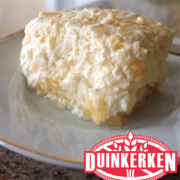Is Tea Gluten Free?
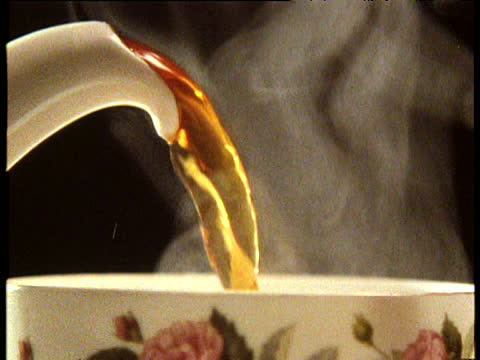 Cheryl from Victoria, BC asks The Celiac Scene: “Would you be in a position to please recommend any black or herbal teas that are safe for a celiac (to the best of your knowledge knowing that we are responsible to check as well from time to time as products change). My daughter has been drinking Red Rose black tea and after phoning the company, we found out they are GF, but no guarantee of no cross contamination.”
Cheryl from Victoria, BC asks The Celiac Scene: “Would you be in a position to please recommend any black or herbal teas that are safe for a celiac (to the best of your knowledge knowing that we are responsible to check as well from time to time as products change). My daughter has been drinking Red Rose black tea and after phoning the company, we found out they are GF, but no guarantee of no cross contamination.”
We went straight to Professor Google and were similarly ‘assured’ by Tetley Tea’s FAQ page:
Q. What if I suffer from celiac disease?
A. Celiac disease is not an allergy or a food intolerance but an autoimmune disease caused by an intolerance to gluten. Authorities have defined a gluten free level below which an intolerance reaction is not triggered. All our products that do not intentionally contain wheat or gluten can therefore be considered gluten free. If we were to find traces of gluten above the “gluten free” level, these would be mentioned under the ingredient list in a “May contain” statement.
Q. What if I am allergic to wheat?
A. Consumers allergic to wheat, should consult with their doctor to obtain medical and dietary advice since we cannot guarantee the absolute absence of wheat cross contamination in our product due to its agricultural origin.
Jane Anderson, Celiac Disease & Gluten Sensitivity Expert, undertook the following comprehensive survey, last updated in January 2014. The Celiac Scene shares it below, with sincere gratitude. Note that the information offers an American perspective, with reference to their rules, regulations and product labels. The Celiac Scene should like to extend its appreciation – and patronage – to businesses who provide our community with definitive, empirical assurances in unequivocal language.
Question: Is tea gluten-free, or does tea contain gluten?
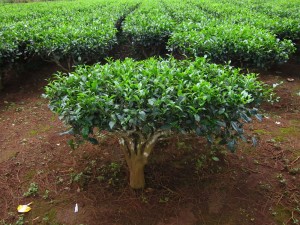
Camellia sinensis
“Traditional plain tea — black or green — is made from the leaves of the Camellia sinensis plant, which is not related to the gluten grains wheat, barley and rye. Therefore, plain tea should be gluten-free, assuming it hasn’t been subjected to gluten cross-contamination in processing.”
However, not all teas are made from Camillia sinensis, and even some that are made from real tea leaves can contain added gluten ingredients. For example, some herbal teas contain barley malt as a sweetener, and some “real” teas have gluten-grain-based flavors (most frequently from barley) in them. That makes it essential to check the ingredients before you take a sip.
In addition, a form of tea made from roasted barley is popular in some Asian countries, including Japan, Korea and China. Therefore, you’ll need to determine exactly what you’re getting when you order “tea” in a restaurant featuring Asian cuisine.
For tea drinkers, it’s definitely a case of “buyer beware” when it comes to gluten. However, most major tea companies keep gluten-free lists (and some are even certified gluten-free), so it’s quite possible to find a type of tea you enjoy that’s also gluten-free. Here’s the list of tea manufacturers, along with their gluten policies and gluten-free lists, where available:
 Bigelow teas offer an extensive selection of teas that are certified gluten-free.
Bigelow teas offer an extensive selection of teas that are certified gluten-free.
 Celestial Seasonings. Most of Celestial Seasonings’ teas are considered gluten-free to at least 20 parts per million, but a handful contain barley, including Roastorama, Sugar Cookie Sleigh Ride, Sugar Plum Spice, Holiday Herbal Tea and Gingerbread Spice. The company says in its gluten statement that it will label non-gluten-containing products as “gluten-free.”
Celestial Seasonings. Most of Celestial Seasonings’ teas are considered gluten-free to at least 20 parts per million, but a handful contain barley, including Roastorama, Sugar Cookie Sleigh Ride, Sugar Plum Spice, Holiday Herbal Tea and Gingerbread Spice. The company says in its gluten statement that it will label non-gluten-containing products as “gluten-free.”
 Lipton tea. Lipton says it does not publish a list of gluten-free tea varieties. However, it will disclose any gluten ingredients on the label. “We recommend that you read the label each time before buying our product. If gluten is present, it is clearly listed in plain language on the ingredient label (i.e., wheat flour, rye, barley, oats, and malt).” There’s also no gluten-containing glue in Lipton tea bags: “We do not use any glue in the assembly of our Tea bags or tags. Where a staple is not used, we use pressure and heat to adhere the string to the tag and the bag.”
Lipton tea. Lipton says it does not publish a list of gluten-free tea varieties. However, it will disclose any gluten ingredients on the label. “We recommend that you read the label each time before buying our product. If gluten is present, it is clearly listed in plain language on the ingredient label (i.e., wheat flour, rye, barley, oats, and malt).” There’s also no gluten-containing glue in Lipton tea bags: “We do not use any glue in the assembly of our Tea bags or tags. Where a staple is not used, we use pressure and heat to adhere the string to the tag and the bag.”
 Mighty Leaf Teas state that “Mighty Leaf Tea and our Co-Manufactures, comply with the policies, standards and auditing requirements of the Gluten-Intolerance Group which allows MLT the privilege to use the Gluten-Free Certification symbol. The products which carry this symbol have been certified to meet their strict standards and provide assurances to those affected with gluten intolerances.” Note: those who are sensitive to corn should be aware that Mighty Leaf uses tea pouches made from corn starch.
Mighty Leaf Teas state that “Mighty Leaf Tea and our Co-Manufactures, comply with the policies, standards and auditing requirements of the Gluten-Intolerance Group which allows MLT the privilege to use the Gluten-Free Certification symbol. The products which carry this symbol have been certified to meet their strict standards and provide assurances to those affected with gluten intolerances.” Note: those who are sensitive to corn should be aware that Mighty Leaf uses tea pouches made from corn starch.
 Red Rose tea. Red Rose labels its black tea, English Breakfast tea, its decaffeinated black tea English Breakfast tea and its Earl Grey tea as gluten-free.
Red Rose tea. Red Rose labels its black tea, English Breakfast tea, its decaffeinated black tea English Breakfast tea and its Earl Grey tea as gluten-free.
 Republic of Tea. Republic of Tea holds gluten-free certification, which means its gluten-free-labeled teas contain less than 10 parts per million of gluten (see the company’s statement here). However, make sure the package you purchase actually is marked with that “GF” logo, since the company doesn’t guarantee all its flavors are safe. One tea flavor — Coconut Cocoa Cuppa Chocolate — contains barley, which of course is a gluten grain.
Republic of Tea. Republic of Tea holds gluten-free certification, which means its gluten-free-labeled teas contain less than 10 parts per million of gluten (see the company’s statement here). However, make sure the package you purchase actually is marked with that “GF” logo, since the company doesn’t guarantee all its flavors are safe. One tea flavor — Coconut Cocoa Cuppa Chocolate — contains barley, which of course is a gluten grain.
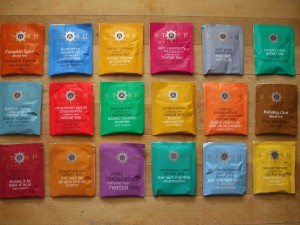 Stash teas. According to a statement from Stash: “All of the flavors used in our blends are gluten-free. We do not use barley malt in any of our blends.” The maltodextrin in Stash iced green tea powder is from corn, and the company’s tea bags are made from wood cellulose.
Stash teas. According to a statement from Stash: “All of the flavors used in our blends are gluten-free. We do not use barley malt in any of our blends.” The maltodextrin in Stash iced green tea powder is from corn, and the company’s tea bags are made from wood cellulose.
 Tazo teas. Tazo, owned by Starbucks, makes four gluten-containing flavors: Green Ginger, Tazo Honeybush, Lemon Ginger and Tea Lemonade. Beware of ordering Tazo tea in a Starbucks shop, since the baristas use the same tongs to pull out each tea bag, so cross-contamination is fairly likely. (For more on Starbucks, check out Gluten-Free Starbucks Guide.)
Tazo teas. Tazo, owned by Starbucks, makes four gluten-containing flavors: Green Ginger, Tazo Honeybush, Lemon Ginger and Tea Lemonade. Beware of ordering Tazo tea in a Starbucks shop, since the baristas use the same tongs to pull out each tea bag, so cross-contamination is fairly likely. (For more on Starbucks, check out Gluten-Free Starbucks Guide.)
 Tetley teas. The company states that, “to the best of our knowledge,” none of its teas contain any gluten ingredients or are at risk for gluten cross-contamination. Tetley does not make flavored teas.
Tetley teas. The company states that, “to the best of our knowledge,” none of its teas contain any gluten ingredients or are at risk for gluten cross-contamination. Tetley does not make flavored teas.
 Twinings teas. Twinings USA does not maintain a gluten-free list on its website, but the company said in an email that all of its teas were gluten-free.
Twinings teas. Twinings USA does not maintain a gluten-free list on its website, but the company said in an email that all of its teas were gluten-free.
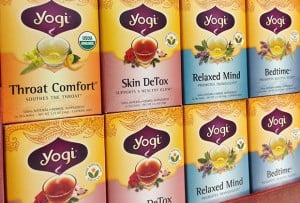 Yogi tea. Several Yogi teas, including Stomach Ease, Calming and Kava Stress Relief, include barley malt as an ingredient. Yogi will disclose gluten ingredients, including barley, on its ingredients lists, so your best bet is to check the label.
Yogi tea. Several Yogi teas, including Stomach Ease, Calming and Kava Stress Relief, include barley malt as an ingredient. Yogi will disclose gluten ingredients, including barley, on its ingredients lists, so your best bet is to check the label.

Jane Anderson, Celiac Disease & Gluten Sensitivity Expert
Again, The Celiac Scene expresses its appreciation to Jane Anderson, Celiac Disease & Gluten Sensitivity Expert.


